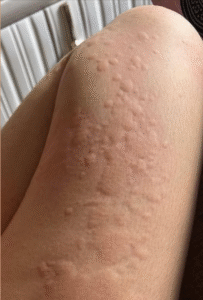Her Whole Body Was Itchy: What She Thought Was a Common Allergy Was Hiding Something More Serious
It started with a subtle itch—barely noticeable, just a faint irritation on her arms. Then it spread. Her back, her legs, her scalp. Within weeks, her entire body felt like it was crawling. She tried everything: antihistamines, oatmeal baths, switching detergents, eliminating foods. But nothing worked. The itch persisted, relentless and consuming.
At first, she thought it was a seasonal allergy. Maybe the pollen count was high. Maybe her skin was reacting to a new soap. But as the weeks turned into months, she began to wonder: What if this wasn’t just an allergy?
The Misleading Simplicity of an Itch
Itchiness—medically known as pruritus—is one of the most common complaints in dermatology. It’s usually benign, triggered by dry skin, insect bites, or mild allergic reactions. But when it becomes chronic, widespread, and unresponsive to treatment, it can be a symptom of something deeper.
According to the , persistent itching can be caused by a range of underlying conditions, including liver disease, kidney dysfunction, thyroid disorders, and even certain cancers. The skin, after all, is not just a barrier—it’s a messenger. And sometimes, it’s trying to tell us something urgent.
Scratching the Surface
She visited her primary care doctor, who prescribed stronger antihistamines and recommended a dermatologist. The dermatologist ruled out eczema, psoriasis, and contact dermatitis. Her skin looked normal—no rashes, no hives, no visible inflammation. Yet the itch was unbearable.
Blood tests were ordered. And that’s when the story took a turn.
Her liver enzymes were elevated. Further testing revealed early signs of primary biliary cholangitis (PBC), a chronic autoimmune disease that slowly destroys the bile ducts in the liver. One of its earliest symptoms? Itchy skin.
When the Liver Speaks Through the Skin
The liver plays a crucial role in filtering toxins and producing bile, which helps digest fats. When bile flow is disrupted—as in PBC—bile acids can accumulate in the bloodstream and deposit in the skin, triggering intense itchiness. This type of itch isn’t relieved by scratching. It’s deep, systemic, and often worse at night.
In her case, the diagnosis came early enough to begin treatment. Ursodeoxycholic acid was prescribed to slow the progression of the disease. Lifestyle changes followed: reduced alcohol intake, regular monitoring, and a new awareness of how her body communicates distress.
The Emotional Toll of Being Dismissed
Before her diagnosis, she had been told repeatedly that it was “just an allergy.” Friends suggested she was overreacting. One doctor implied it might be stress. The emotional toll of being dismissed—of having her suffering minimized—was nearly as painful as the itch itself.
This is a common experience for patients with invisible symptoms. When there’s no rash, no swelling, no obvious sign of illness, it’s easy to be overlooked. But as notes, persistent itch can be a red flag for serious internal conditions, and it deserves thorough investigation.
Other Hidden Causes of Itch
Her story is not unique. Many systemic diseases manifest first through the skin:
- Kidney disease: Uremic pruritus is common in patients with chronic kidney failure, often appearing before other symptoms.
- Thyroid disorders: Both hyperthyroidism and hypothyroidism can cause skin changes and itchiness.
- Hodgkin’s lymphoma: One of the hallmark symptoms is unexplained itching, sometimes without any other signs.
- Diabetes: Poor circulation and nerve damage can lead to itchy skin, especially on the lower limbs.
In each case, the itch is not the disease—it’s the signal.
Listening to the Body’s Whispers
What makes stories like hers so powerful is the reminder that our bodies often whisper before they scream. An itch may seem trivial, but when it persists, it deserves attention. The skin is a canvas on which internal disorders sometimes paint their first strokes.
Her journey from confusion to clarity was not just medical—it was emotional. She learned to advocate for herself, to push for answers, and to trust her instincts. She also learned that healing is not just about medication—it’s about validation.
A New Chapter
Today, her condition is managed. The itch has subsided, though it occasionally returns as a reminder. She’s become an advocate for others experiencing unexplained symptoms, urging them to seek answers and not settle for dismissals.
She speaks at patient support groups, sharing her story and encouraging others to listen to their bodies. “If something feels wrong,” she says, “don’t let anyone tell you it’s nothing. You know your body better than anyone.”
Conclusion: Beyond the Surface
Her story is a testament to the complexity of health and the importance of persistence. It reminds us that symptoms are not always what they seem, and that the body often speaks in subtle ways.
An itch may be just an itch. Or it may be the first sign of something serious. The key is to listen, to investigate, and to never underestimate the power of a symptom that refuses to be ignored.


